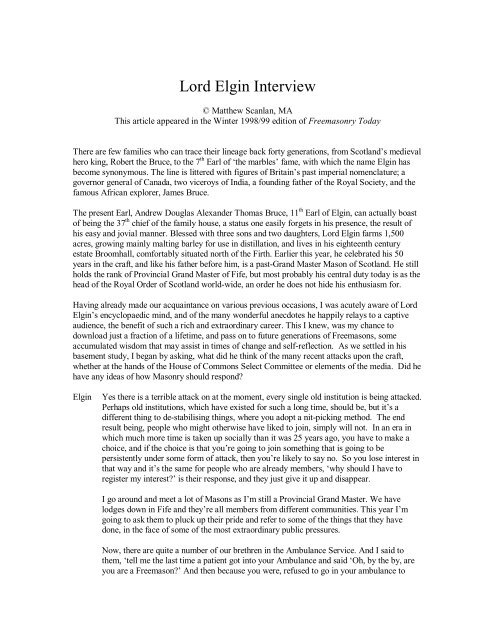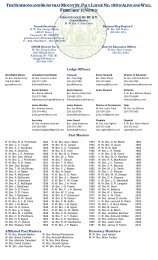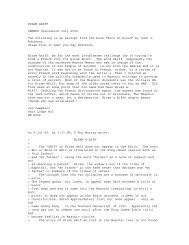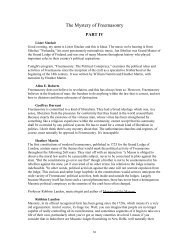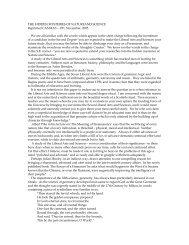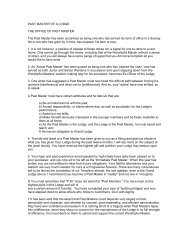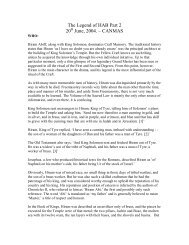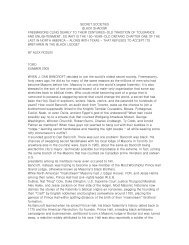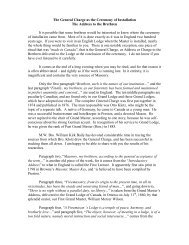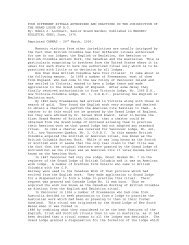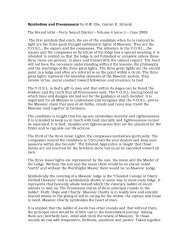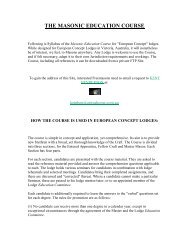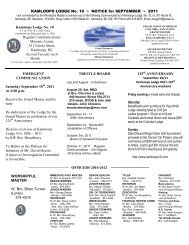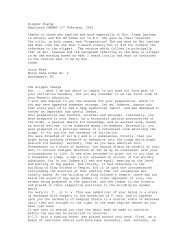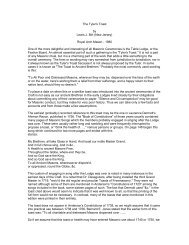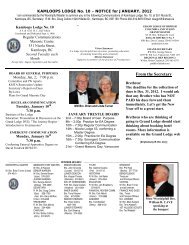Lord Elgin Interview - Kamloops Freemasons
Lord Elgin Interview - Kamloops Freemasons
Lord Elgin Interview - Kamloops Freemasons
Create successful ePaper yourself
Turn your PDF publications into a flip-book with our unique Google optimized e-Paper software.
<strong>Lord</strong> <strong>Elgin</strong> <strong>Interview</strong><br />
© Matthew Scanlan, MA<br />
This article appeared in the Winter 1998/99 edition of Freemasonry Today<br />
There are few families who can trace their lineage back forty generations, from Scotland’s medieval<br />
hero king, Robert the Bruce, to the 7 th Earl of ‘the marbles’ fame, with which the name <strong>Elgin</strong> has<br />
become synonymous. The line is littered with figures of Britain’s past imperial nomenclature; a<br />
governor general of Canada, two viceroys of India, a founding father of the Royal Society, and the<br />
famous African explorer, James Bruce.<br />
The present Earl, Andrew Douglas Alexander Thomas Bruce, 11 th Earl of <strong>Elgin</strong>, can actually boast<br />
of being the 37 th chief of the family house, a status one easily forgets in his presence, the result of<br />
his easy and jovial manner. Blessed with three sons and two daughters, <strong>Lord</strong> <strong>Elgin</strong> farms 1,500<br />
acres, growing mainly malting barley for use in distillation, and lives in his eighteenth century<br />
estate Broomhall, comfortably situated north of the Firth. Earlier this year, he celebrated his 50<br />
years in the craft, and like his father before him, is a past-Grand Master Mason of Scotland. He still<br />
holds the rank of Provincial Grand Master of Fife, but most probably his central duty today is as the<br />
head of the Royal Order of Scotland world-wide, an order he does not hide his enthusiasm for.<br />
Having already made our acquaintance on various previous occasions, I was acutely aware of <strong>Lord</strong><br />
<strong>Elgin</strong>’s encyclopaedic mind, and of the many wonderful anecdotes he happily relays to a captive<br />
audience, the benefit of such a rich and extraordinary career. This I knew, was my chance to<br />
download just a fraction of a lifetime, and pass on to future generations of <strong>Freemasons</strong>, some<br />
accumulated wisdom that may assist in times of change and self-reflection. As we settled in his<br />
basement study, I began by asking, what did he think of the many recent attacks upon the craft,<br />
whether at the hands of the House of Commons Select Committee or elements of the media. Did he<br />
have any ideas of how Masonry should respond?<br />
<strong>Elgin</strong><br />
Yes there is a terrible attack on at the moment, every single old institution is being attacked.<br />
Perhaps old institutions, which have existed for such a long time, should be, but it’s a<br />
different thing to de-stabilising things, where you adopt a nit-picking method. The end<br />
result being, people who might otherwise have liked to join, simply will not. In an era in<br />
which much more time is taken up socially than it was 25 years ago, you have to make a<br />
choice, and if the choice is that you’re going to join something that is going to be<br />
persistently under some form of attack, then you’re likely to say no. So you lose interest in<br />
that way and it’s the same for people who are already members, ‘why should I have to<br />
register my interest?’ is their response, and they just give it up and disappear.<br />
I go around and meet a lot of Masons as I’m still a Provincial Grand Master. We have<br />
lodges down in Fife and they’re all members from different communities. This year I’m<br />
going to ask them to pluck up their pride and refer to some of the things that they have<br />
done, in the face of some of the most extraordinary public pressures.<br />
Now, there are quite a number of our brethren in the Ambulance Service. And I said to<br />
them, ‘tell me the last time a patient got into your Ambulance and said ‘Oh, by the by, are<br />
you are a Freemason?’ And then because you were, refused to go in your ambulance to
hospital, because they didn’t think you were a suitable person to be driving. We also had a<br />
man who was assistant Provincial Chaplain who is a full-time fireman and also a part-time<br />
minister of the Church of Scotland. He made a really brilliant save on top of a multi-story<br />
block in Leith, which involved talking people out who were trapped. And I said, ‘would<br />
you by any chance tell them before they jumped that you were a Freemason?’ You see if<br />
you try and get the ridiculous on your side, then people laugh, and can begin to realise that<br />
you can to fight back. ‘It’s like all things, the enemy who can’t, won’t, or it’s not in his<br />
nature to strike back is the most marvellous target.'<br />
One thing I fear will never work, and that is attempting to buy your way out. I don’t think<br />
you can do this through massive giving to charities. On the other hand, if you place it in a<br />
careful way, where the community sees that it has come as a result of a number of men who<br />
also live in the community, who have seen the need, and then have collectively moved<br />
together to try and overcome it, then I think you can use money to make a point.<br />
The curious thing is that in another Order, the Royal Arch, where we have a certain amount<br />
of money in Scotland, not by English standards, but we can make a significant donation in<br />
part of the community every year. And a year or two back, I presented on their behalf a<br />
significant sum for key-hole surgery. I got back here about 4 O’clock in the afternoon, and<br />
the telephone rang and it was one of the National broad-sheets asking what on earth was<br />
Freemasonry in Scotland doing, giving money to key-hole surgery. Didn’t we know that it<br />
is the most scandalous and totally inappropriate way to go about surgery.<br />
By far the largest amount of money paid in Scotland by Masonry, is in rates to local<br />
government. If this money could go to Masonic charities instead, people would be simply<br />
amazed. We could theoretically apply for a 50 per cent rebate, but if you did that, you<br />
would find someone would jump up and say that there is no way such a scandalous body<br />
should obtain a rebate, and so the full whack is paid.<br />
MS. How much have you noticed a change in public attitude towards Freemasonry during your 50<br />
years as a member of the Order?<br />
Well, it’s a curious thing, it was taken as a matter of course, that there would be Masonic<br />
appearances, photographs of gatherings, brethren meeting together, and it was all taken as a<br />
matter of course. There was never any aggravation about it all, and it’s during my lifetime I<br />
suppose, over the last fifty years, that this problem has developed. Convenience is<br />
probably, or lack of convenience, one of the most devastating things as a whole in society.<br />
Because its more convenient to take your wife, your girlfriend, to whatever it is, and<br />
consequently the weekly budget dictates that you can’t just take out your bit for the<br />
Masons. The motor car, the holiday on the costas, the outfit for the children, and all the<br />
things you can buy for the home. It all costs a lot of money.<br />
MS. As we go through the next millenium, do you see a positive future for the craft?<br />
The future that everybody wanted, was that there should be safety valves in the community,<br />
where people can find somewhere where they get enormous comfort in each others<br />
company. There are very few safety valves or places where people do meet in each other’s<br />
ease, and I think that our forefathers knew this very well, and to a certain extent they<br />
encouraged it. The valves are now being tampered with from outside. Some fifteen years<br />
ago it was made quite clear from the senior law officers of Scotland, that Sheriffs would not
e encouraged to be seen going about Masonic duties. As a consequence, we now have<br />
practically no sheriffs as members, and this goes for judges as well.<br />
Of course, many people are employed by local councils in Scotland, and I happen to know<br />
that many of their employees are <strong>Freemasons</strong>. Now where a council happens to be failing<br />
in some capacity or another, it would be very sad, if as a sort of fop for inefficiency, we are<br />
now going to witness a whole raft of measures of exposure which would force <strong>Freemasons</strong><br />
to consider their employment over the craft. The curious thing is that, up to the late <strong>Lord</strong><br />
Ross, (Willie Ross) every single Secretary of State for Scotland, who had been a Labour<br />
Secretary of State, had been a very staunch and extremely active Freemason. I was on a<br />
Parliamentary Committee many years ago with an MP for Hamilton, who had been before<br />
he became an MP, the Boiler Maker’s secretary, and was also a Freemason. Another, was a<br />
secretary of state of the Scottish TUC who had also been secretary of a lodge. Masonic<br />
lodges date back in Scotland 400 years, and next year we have celebrations planned<br />
marking that. There are very few Institutions who can boast of an unbroken lineage for four<br />
centuries.<br />
You mentioned the 18 th century few minutes ago, and if one looks at the craft then, and the<br />
founding fathers of modern Freemasonry, do you believe that they had something to offer that<br />
we’ve lost? I mean so many Masons were also members of the Royal Society, or painters, sculptors,<br />
architects, writers and explorers. There were many creative people endorsing the movement, who<br />
were inspired and indeed their Masonry in turn, inspired them?<br />
Well you see, their thoughts were being thought before the ritual was developed as it is<br />
today. Nowadays we are so absorbed by ritual, but in those days, it was what they were<br />
thinking that helped to form the rituals. It was a period of freethinking, they were drawing<br />
on the huge reserves of the renaissance, going back and plucking something out of the<br />
cupboard and having a look at it. Those freethinkers were of a respite, because they had<br />
moved out of the Civil War, they’d fought and become so horrified by futility of it all. They<br />
moved out to Holland considering things, wrote to each other and then returned. And<br />
undoubtedly, these figures moved around and within the framework of the Royal Society.<br />
Of course there was also a spiritual dimension to their scientific and philosophical enquiries. Do<br />
you think the spiritual side of Freemasonry has been a little lacking in recent years, which if<br />
rekindled, could help Freemasonry capture the imagination of younger generations, who seem to be<br />
greatly interested in searching for something meaningful now?<br />
Well yes, we used to have a lot of preachers in Scotland. Over the last few years the<br />
landowner, the Laird and the ministers of the church have sadly gone, although there local<br />
Presbytery here are all against the Craft, possibly because a large number of ministers now<br />
are women. Somewhere in Africa a few years ago, there was an attempt by certain parties<br />
to ban Freemasonry through the courts. The judge however, in his summing up said, that<br />
he’d never heard so much nonsense and concluded that Freemasonry was the hand maiden<br />
of the church.<br />
There has been recent criticism over the alleged origins of the craft, and the London Grand Lodge’s<br />
insistence upon 1717 date of origin. Although this criticism has generally emanated from some<br />
rather wild and unsubstantiated populist sources, what do you believe would be the result of a<br />
discovery of an older link pre-1717?
In Scotland we have always accepted that we evolved as a movement, we didn’t suddenly<br />
pretend. I can quite understand and respect this business of having the first Grand Lodge,<br />
by all means, if that’s what you like then have it, but don’t foist it on everybody else. Even<br />
after they formed a Grand Lodge in Scotland, they didn’t do a great deal. They met twice a<br />
year and they met at Parliament House, in the Scottish Parliament Building, which is now<br />
used as the main court of judiciary. And they went with a torchlight procession all around<br />
the town. Just imagine the furore, if for the year 2000 if we said we are going to re-assert<br />
our rights and meet in the Parliament Building?<br />
Do you feel there have been too many assumptions made regarding Masonic history?<br />
Yes. It’s very difficult to do original research if you haven’t had a full education, and in this<br />
respect the man I admire enormously is of course, Professor David Stevenson, because he<br />
is a Professor of Scottish social history and knows his subject exceedingly well. He asked<br />
himself, how did the <strong>Freemasons</strong> figure in all this, and then he went and had a look.<br />
Freemasonry beyond these shores has stood for tolerance often in societies not exactly as familiar<br />
with that ethos in the society at large.<br />
Our lodges in Trinidad, Panama, Chile, Peru, Argentina, are all 70 per cent Roman<br />
Catholic. Many of them who come over to the Royal Order in Edinburgh are Roman<br />
Catholics, including many French who belong to the lodges of the Grand Nationale Loge<br />
Francaise, and we’ve now got four Jesuit priests who are members of the Royal Order.<br />
One of the first journeys my wife and I made in a Masonic capacity was to the Lebanon and<br />
Jordan. Amongst other members of the Golden Throne Lodge, which in those days met on<br />
the Jordanian side of Jerusalem, was the chief of the so-called special police, the secret<br />
police. And he frequently came over to Scotland and he knew a lot of the chiefs, because<br />
he’d been at Police College in Scotland. Also his number two was also a member of the<br />
lodge. Two weeks later the Pope went to Jordan and visited the reputed site of the Baptism<br />
of Christ, and standing on either side of His Holiness, were two senior policemen, who I<br />
knew were both Scottish <strong>Freemasons</strong>. (laughs) Well, times have changed!<br />
We went to a lovely place in the Bekaa valley in the Lebanon, and the lodge and the<br />
chapter there operated throughout the difficulties of the civil war. And about every five<br />
years they sent someone back to Scotland with a bag of money to pay their dues. I met one<br />
of them about four years ago, and asked them how they were. He explained, that their lodge<br />
room was first taken over by the Syrian army, and then an American battleship came up<br />
and fired its 16-inch guns at them, which demolished the lodge room. So they had to resort<br />
at meeting in one of the brothers’ houses. Of course Beirut is a different thing and always<br />
was, but they’re rebuilding and I’ve no doubt they’ll go back.<br />
They got a charter from the Grand Lodge of Egypt, which had been originally set up by<br />
<strong>Lord</strong> Kitchenour. The thirty original members threw in a hand full of gold sovereigns and<br />
they bought a plot of land and built a lodge building. Over a period of time, the property<br />
was swamped by the expanding suburbs of Beirut, and they built a multi-story block on top.<br />
When the rent needed to be collected, the reigning master was allowed to collect up the<br />
money, which needless to say, caused some problems.
Many years ago, we also visited Egypt before Freemasonry was banned, and visited a lodge<br />
that worked in Arabic. The candidate came in for his initiation in the first degree, which<br />
involved a special custom of the lodge to prove that he had been divested of all worldly<br />
wealth before his entrance. It involved the Deacon bringing in a little bag on his wand,<br />
which was supposed to represent his entire worldly wealth. Suddenly the brethren just fell<br />
about laughing, and I asked ‘what’s the joke?’ ‘Oh’ he said, ‘the candidate is the richest<br />
banker in Beirut!’<br />
Do you have any special memories from your time in the craft?<br />
We had lodges in Tehran at the time of the Shah, who wanted their own Grand Lodge,<br />
and so it was granted that I should have an audience with the Shah in person. The<br />
audience lasted about 40 minutes when it was only supposed to be for half that time. We<br />
covered every possible subject and I think he knew very well what Masonry was all<br />
about, but at the same time he was constantly looking over both shoulders, guarding<br />
himself against some form of conspiracy, which might come into Iran under the<br />
modernising ideas of the west. In actual fact, I would not necessarily know the characters<br />
of his country, but they seemed to be good fellows to us.<br />
That interview was in the Lesser Palace, which was hung with modern tapestries, and we<br />
couldn’t see the door was, we were simply ushered in and then the door closed behind us,<br />
leaving just tapestries. When the time came for us to leave, we were bowing our way out<br />
and I was fiddling behind my back trying to find the door handle. It was the most<br />
extraordinary meeting with a crown head I’ve ever had.<br />
Normally, in a meeting with the Queen, she presses a button, the door opens, and you’re<br />
out. When we finally got out into the street, our Iranian friends were sitting there<br />
trembling with fear, an hour had passed and we still hadn’t appeared, they thought we’d<br />
been done away with. So we said ‘no, we’ve been talking to the Shah’. ‘All this time?’<br />
they replied, and we said ‘yes, of course!’ ‘That’s amazing, he never speaks to anyone for<br />
more than 15 minutes!’, they exclaimed.<br />
However, the most extraordinary episode for me was when a very distinguished West<br />
African Judge, who’d become Chief Justice of the Appeal Court of Kenya, was also in<br />
the chair of a lodge. At the same time, the President Jomo Kenyatta, decided to give a<br />
cocktail party, which also coincided with a meeting of the African states in Kenya.<br />
President Kenyatta came through to talk to us as we were all drinking orange juice, and<br />
asked ‘who are all these people?’ I explained to him that it was a delegation of<br />
<strong>Freemasons</strong>, and almost as soon as I had, he saw the African Judge who was an old<br />
acquaintance of his, and asked ‘what’s he doing there?’ He immediately went over and<br />
greeted him and said, ‘is it true, are you a Freemason?’ Of course I am Jomo!’ came the<br />
reply. With that, Kenyatta clapped his hands and all the servants rushed up, ‘take this<br />
orange juice away and bring champagne.’ It was marvellous, totally spontaneous’.<br />
As the laughter dissipated, we were offered glances at various books in his study library which<br />
might be of interest, and then, after a short while his gaze fell upon my friend, Alexandra<br />
Tiligada, who was sportingly clutching some of my camera equipment. ‘And what are you doing<br />
here?’, he enquired in a sympathetic tone. She rather timidly responded, and explained that she<br />
was a student of ancient Greek and Latin philology, and was spending a year out of her home in<br />
the Peloponese, studying for her Masters degree in London. ‘You must be bored stupid’, he said,<br />
‘let’s take you upstairs, I’ll know you’ll probably be wanting to see the marbles!’
As we were slowly led out of the basement study and into the house proper, it became noticeable<br />
that the Earl’s pace was hindered by of a small limp, the result of a leg-wound received in<br />
Normandy in 1944. After swopping some relevant anecdotes on the subject, I asked whether he<br />
had seen Saving Private Ryan yet, the controversial and extremely hard-hitting recent Steven<br />
Spielberg film, dealing with the American experiences during the D-Day Normandy landings.<br />
‘No, I haven’t seen the film. I suppose the most terrifying thing for me on the beaches was a<br />
British Royal Navy beach master with his beard and dog. Of course, I should have turned around<br />
and gone back to England then, we’d landed on the wrong beach, at the wrong time, with the<br />
wrong method.'<br />
Once in the main part of the house, we were proudly shown some original sketches executed by<br />
his infamous ancestor whilst he was surveying the ancient Greek sites, and once more the<br />
conversation move towards a lament over the apparent reticence of academics in Britain to<br />
mention Masonic involvement in conventional history. ‘Sadly the history books don’t mention<br />
Freemasonry that much, which is an oversight that needs to be addressed. For example, if a new<br />
settlement was built in New Zealand when it was being colonised, very often the first thing they<br />
constructed was the church, closely followed by the Masonic lodge. And there’s no way you can<br />
ignore that, it has been an important ingredient of social history.'<br />
A poignant reminder of the failure to record the importance of Freemasonry’s historical influence, is<br />
evident from a casual perusal of some of the recent biographical works on the infamous 7 th <strong>Lord</strong><br />
<strong>Elgin</strong> (and 11 th Kincardine, 1766 – 1841), and his purchase of the great Athenian marbles which<br />
now bear his name. Most of the works fail to mention of the fact that the 7 th Earl was also a<br />
Freemason, initiated into the St. David Lodge, No.36 in Edinburgh in 1819, who later, in the same<br />
year, became a joining member of the Naval and Military Lodge, No.40. He was exalted into the<br />
Royal Arch, and held the rank of Grand Zerubbabel from 1827 until 1835. Puzzled by these careless<br />
omissions and by the obvious neglect of an important aspect of the great man’s character, the<br />
current Earl appeared confident that that his notorious ancestor was inspired by his Masonic<br />
membership, but added, that he ‘was passionate about many things, and a great enthusiast<br />
generally.'<br />
As a soldier, diplomat and first British ambassador to the Ottoman Empire, the 7th earl supposedly<br />
rescued the sculptures at a time when the Turks were using the Parthenon for target practice, though<br />
this version of events is still a matter of some controversy among historians. He was keenly<br />
interested in classical art, and managed to obtain permission from the Turks after his arrival as<br />
envoy extraordinary at Constantinople in 1799, to record and remove the antiquities, arranging for<br />
their safe passage to England. Many of the sculptures were subsequently sold to the British Museum<br />
in 1816, but some stelae or grave-markers, carved with figures or lettering, not wanted by the<br />
museum, still adorn the walls of <strong>Lord</strong> <strong>Elgin</strong>’s country house. However, not all the pieces originate<br />
from the Acropolis. For at the centre of this magnificent room with its coffered ceiling and marble<br />
floor, rests an unidentified Roman head casually set upon the mantle-piece. The walls are richly<br />
hung with paintings and objects d’art, and towards the window with its views over the estate, sits a<br />
marble seat, apparently a replica of the judgment throne of the Olympic games of 412BC. (The<br />
original is in the Getty Museum in Malibu, California.)<br />
Adjacent to this elegant treasure trove is an elegant library that would easily satisfy the most<br />
veracious of bibliophiles, where once again the importance of the past resonated strongly. Did he<br />
believe that it is crucial for Masons today to understand the movement’s past, if only to be better<br />
informed for its future navigation?
Yes, I agree with you completely. There is one type of mason unfortunately who believes<br />
that because they’ve taken an oath, there is no way they are going to divulge any<br />
information, for it might cause them to be chopped up. The other type just go over the top<br />
into looking at the sort things the 19 th century developed, the most extraordinary rituals.<br />
As the craft goes through something akin to a catharsis, is there anything you would wish to say<br />
to the younger generations coming along?<br />
I don’t really know the answer. I think you’ve got a marvellous new Grand Secretary.<br />
I’ve got a letter from him here in his own hand, which I doubt whether either myself or<br />
my father or I ever got from preceding ones, that we knew quite well. Times have<br />
changed!<br />
As Europe unites in the greater world outside, how do you see Freemasonry adapting to such a<br />
changing international scene? I am reminded of the Chevalier Ramsay’s famous Masonic oration,<br />
‘The World is a Republic and each nation a child.'<br />
All the good Masonic elements of character have to be involved. I would far rather it<br />
happened out with the grandiose but I think people might find a great deal in common.<br />
Yes, I think we’ve got a very long way to go, but I think there are a lot of people from all<br />
backgrounds who could enjoy fellowship, friendship, fraternity and discussion which<br />
would be a benefit to themselves and to the overall picture.


